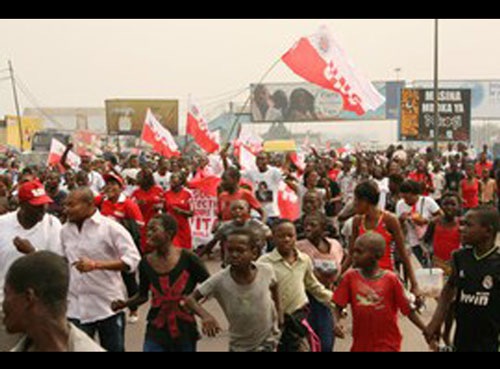Atalaku
-
Réalisé par Dieudo Hamadi • Écrit par Dieudo Hamadi
-
Congo Kinshasa (RDC) • 2013 • 60 minutes • Vidéo HD • Couleur
- Réalisation :
Dieudo Hamadi - Écriture :
Dieudo Hamadi - Image :
Dieudo Hamadi - Son :
Dieudo Hamadi - Montage :
Dieudo Hamadi, Penda Houzangbe
- Production (structure) :
Mutotu Productions - Ayant droit :
Mutotu Productions
- N° ISAN :
non renseigné
Résumé
"L’élection présidentielle de 2011 fut la deuxième élection libre seulement, depuis l’indépendance de la République démocratique du Congo en 1960. Gaylor, pasteur sans-le-sou (comme une majorité des neuf millions d’habitants de Kinshasa) se métamorphose en atalaku, "crieur" en lingala. Il fait affaire avec le député le plus offrant dont il assure la publicité dans la rue et pour qui il déniche des musiciens qui composeront la chanson de sa campagne. Atalaku n’aurait sans doute pu être tourné par un non-Congolais, tant il semble faire corps avec ceux qu’il filme – le réalisateur est parfois sommé de filmer tel bourrage d’urnes, et la foule trop dense s’écarte à son passage, confusément convaincue qu’il faut un témoin. La construction du film rend compte d’un effet-domino entre l’atalaku et les relais qu’il paie à son tour – musiciens, vendeuses, danseurs... –, jusqu’au vertige puisque Gaylor, prêcheur d’un dieu bien éphémère, se voit reprocher son incapacité à tenir les promesses des autres. En choisissant de continuer à tourner deux semaines après l’élection, Hamadi ménage un épilogue en forme de sortie de l’immersion parfois violente qui fait aussi la force de son film."
(Charlotte Garson, Cinéma du réel 2013)
"The 2011 presidential election is only the second free election since the Democratic Republic of the Congo gained independence in 1960. Gaylor, a penniless (like most of Kinshasa’s nine million inhabitants) pastor turns into an atalaku, which means a “crier” in Lingala. He makes a deal with the political candidate who has offered him the highest price for his services: ensuring the campaign’s street publicity and finding musicians to write the campaign’s song. Atalaku could certainly not have been made by a non-Congolese, given the extent to which the filmmaker becomes one with those he films – he is sometimes summoned to film ballot-box stuffing and the teeming crowd make way for him, dimly aware that having a witness is crucial. The film is constructed so as to show the domino effect between the atalaku and those he pays down the line – musicians, salespeople, dancers – to a point of confusion as Gaylor, who preaches for a very ephemeral god, is blamed for his inability to keep the promises of others. Hamadi’s choice to continue filming two weeks after the election alllowed him to accommodate an epilogue that breaks with this occasionally violent immersion, which also gives the film its force."
(Charlotte Garson, Cinéma du réel 2013)
Mot(s)-clé(s) thématique(s)
Sélections et distinctions
- 2013 • Images en bibliothèques • Paris (France) • Film soutenu par la Commission nationale de sélection des médiathèques
- 2013 • RIDM - Rencontres internationales du documentaire de Montréal • Montréal (Canada) • Sélection
- 2013 • FIDADOC • Agadir (Maroc) • Prix du Jury
- 2013 • Cinéma du réel • Paris (France) • Prix Joris Ivens
Comment avoir accès au film ?



